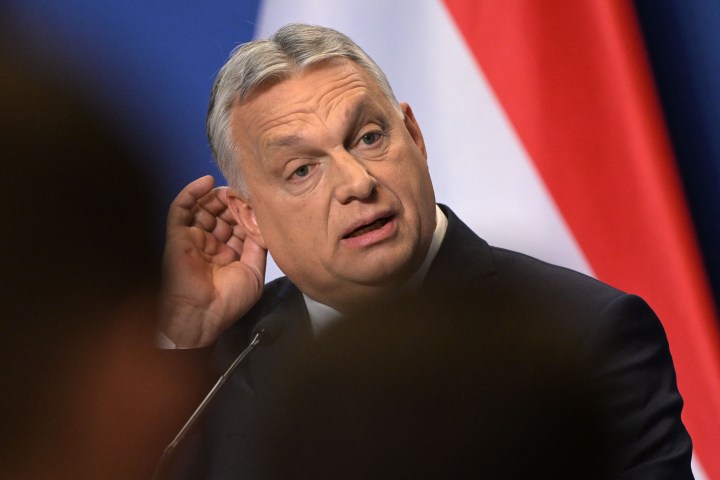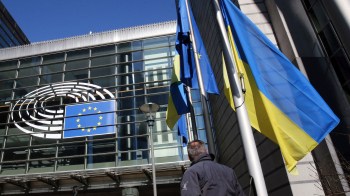
EU ramps up financial pressure on Hungary’s right-wing government
EU ramps up financial pressure on Hungary’s right-wing government

All is not well with the Hungarian economy: Inflation is raging at 20% and government borrowing costs have doubled to 10%. And adding to its woes, the country has been cut off from much needed subsidies and grants from the European Union.
“There is a huge deficit and the EU funds are needed to cover the deficit, this year’s and next year’s as well,” said Rudolf Berkes, an analyst with the Political Capital think tank in Budapest. ”It is of the utmost importance for the Hungarian regime to receive EU funds to continue its operations and to continue to increase its power domestically.”
Hungary currently stands accused of breaking EU discrimination laws, lowering democratic standards and cozying up to Russian President Vladimir Putin. As such, the European Commission is denying the Hungarian government and its recently reelected leader, Viktor Orbán, EU support funds worth some $13 billion (and eventually perhaps as much as $27 billion).
The funds have also been withheld as part of a long-running series of disputes between Brussels and Budapest over issues including anti-gay and anti-trans Hungarian legislation that stands in violation of international human rights laws, per a panel of experts from the Council of Europe. (For his part, Orbán maintains that the law is designed to protect minors from what he calls “unhealthy” propaganda and he has accused the EU of meddling in Hungary’s domestic affairs and attempting to impose a “woke” ideology on what he describes as his country’s socially conservative culture.)
“He’s saying he’s standing up for Hungarian interests against Brussels which he sees as far too liberal and not really in tune with the Hungarian outlook on life,” said Oxford Analytica Senior Analyst, Eastern Europe, Michael Taylor.
The EU also has concerns about the standard of democracy in Hungary and the government’s control of the media, as well as concerns surrounding corruption, particularly when it involves grants and subsidies from Brussels.
“Some of the money goes straight into the pockets of Viktor Orbán’s cronies. That’s not what the European Union thinks it’s meant to be doing,” Taylor said.
The Hungarian Foreign Ministry and the office of Members of the European Parliament from Hungary’s ruling Fidesz party did not respond to Marketplace’s request for comment. It would seem, however, that Orbán has accepted that a crackdown on corruption may be necessary, given that his government recently committed to a raft of anti-corruption reforms in the hopes of retaining EU funding.
Other reasons for the rift between Brussels and Budapest include Orbán’s pro-Putin sympathies, which have outraged most of the EU member states and prompted Dutch and French leaders to ask whether Hungary really belongs in a club of liberal democracies.
That’s a good question, said Sandra Kröger, associate professor of political science at the University of Exeter, and head of the school’s Centre for European Studies.
“Hungarian democracy has deteriorated,” Kröger said. “These days it’s an autocracy. And that’s dangerous for the European Union because Hungary is participating in its decisions. It undermines how the EU works. It undermines its legitimacy.”
There is no mechanism for expelling a member state, and Hungary would have to choose to leave of its own accord. But there’s little chance of that, said Berkes. EU membership is too important to Hungary, politically and economically.
“Basically the last 10 years of growth in Hungary has been due to these EU subsidies: they represent between 3 and 4% of Hungarian GDP each year,” Berkes said. “Membership of the EU is completely vital. It’s the only thing that keeps us from being poor and isolated.”
Kröger agrees that “Hungarexit” is not in the cards. “It’s not just that the Hungarian population is overwhelmingly in favor of membership,” she said. “It’s also clear that Orbán himself doesn’t want to withdraw. That would clearly be an own goal which he has avoided so far, and I think he will continue to do so.”
The EU’s financial pressures may in the end prove effective. Orbán is facing a fiscal crisis with borrowing costs spiraling upwards and a population resistant to tax hikes. He may have to give way to more of the EU’s demands if he wants to get his hands on those vital but elusive billions from the bloc.
Correction (Nov. 8 2022): A previous version of the story omitted the word “own” from the phrase “own goal” in Sandra Kröger’s quote.
There’s a lot happening in the world. Through it all, Marketplace is here for you.
You rely on Marketplace to break down the world’s events and tell you how it affects you in a fact-based, approachable way. We rely on your financial support to keep making that possible.
Your donation today powers the independent journalism that you rely on. For just $5/month, you can help sustain Marketplace so we can keep reporting on the things that matter to you.


















